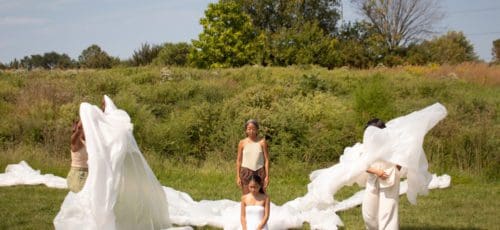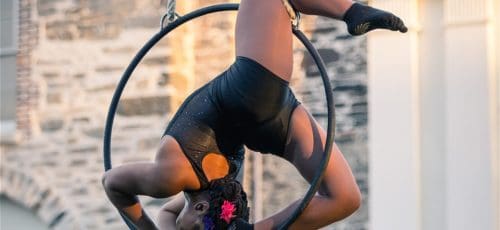“The Middle of the Alphabet”: A Conversation with BodyFields Performance Collective
Briel Driscoll wears her hair parted down the middle, in two small buns behind and below her ears; it’s playful, I think. She shifts on the tufted cushion of a faux-Victorian couch to face Nikki Roberts, co-collaborator of movement group BodyFields Performance Collective whose Experiencing people as really kind of huge is part of this year’s Philly Fringe.
“Was it Shakespeare?” Briel asks.
“No, but it was some classic literature,” Nikki says. “I would say that’s one of our early, crowning achievements. If nothing else, we were persuasive: we talked our high school English teacher into, instead of writing a paper, into letting us make a dance about it.”
“We were supposed to do it on the school stage, but for some reason we couldn’t at the time. So we said, ‘Let’s go to the library,’” Briel says. “It was that carpet that’s really rough. We got crazy rug burns. We all came out of that bleeding really heavily.”
After the jump: local musicians Son Step, and getting inked with friends
On second glance, I decide Briel’s hairdo is utilitarian, culled from the pages of some agri-chic magazine: should your hair be colored like wheat crop, pull it back in two parts; practice now on your head, and this year’s corn harvest will be easier to husk.
“We grew up together in rural Pennsylvania,” says Nikki. “The middle of nowhere,” Briel clarifies. “I’m not sure I really lived in a town at all, unless you call a circle of houses and some horse and goat pastures a town.” The two met briefly as six-year-olds, and then reunited when Nikki entered public elementary school after a stint of home schooling. Their friendship thrived despite life in a small town.
“You have to drive if you want to get anywhere and it’s at least ten to fifteen minutes,” says Briel. “There is only one stoplight in Dunlo, the town Nikki grew up in, a few miles from me.”
Nikki admits that moving to Philadelphia was a great decision. The two recently graduated from Temple’s Boyer College of Music and Dance, earning degrees in dance and taking advantage of the guest artists the college invites to lead class (among this year’s visiting choreographers are Laura Peterson and Ananya Chatterjea). While there, Nikki and Briel founded BodyFields Performance Collective, a group interested in what movement terrain looks like when trained dancers and musicians come together.
“We have musicians in our core group of people and then we also have some trained dancers, but really at this point we’ve been working to meld those two art forms. Our musicians are doing as much dance as we are, and we’re doing music to some extent as well,” says Briel.
For their Fringe showing the collective is collaborating with Philly musicians Son Step (check out their stellar “Forks” below), whose members have been lending their work to BodyFields since it’s inception. Their involvement knocks the count up to ten dancers, a crowd by some performance standards (an idea participants in this year’s Le Grand Continental might sneer at). Because of hectic schedules though, hands rotate through for good absorption measure.
“Having so many people, there’s usually at least one person missing from rehearsal,” says Nikki. “It takes time to figure out how you all together and how you all work towards the goal. For us, the goal is how do we get to a point where we can all be contributing. It was challenging at times; we had people step out and leave for a while and then come back. They need space to digest and work it out.”
“It’s not one person choreographing or one person directing, but we’re working as a unit,” says Briel. “Even if it’s a duet that’s being worked on, two people are onstage performing it—playing, exploring, investigating, and then the other people that are left are really just sitting, watching, observing, and its really just a conversation back and forth. It’s super active. You’re part of it. We’re all a part of every piece. It’s really one brain, one body.”
The title of their Fringe show is a product of this ‘one brain,’ and the idea that the audience has an active part in helping shape the performance’s semantic field; Experiencing people as really kind of huge, and the show’s description then, is really just a stream of suggestive thought: “Really the word huge isn’t exactly appropriate, although it is a really good word. I would probably use the word immense. Immense in the same way that becoming totally and completely immersed underneath a sea of exploding volcanoes would be; underneath a soaking wet idea.” It’s a show that springs not from a not-knowing, but an openness to knowing a lot.
For example, maybe the show is premised on a ‘Lilliputian effect’; Briel explains that one of the collective’s members is tall, so seeing him dance with one of the smaller members caused him to appear ‘really kind of huge.’
Nikki is hesitant, and thinks maybe that wasn’t the show’s beginning, so Briel thinks again, this time offering up a philosophical explanation: “We as humans look at ourselves as we’re just normal-sized. This chair is normal-sized for us, and that cup is, but what are you comparing that to? If you’re an ant, I’m huge.”
I place my mug of chai tea back on the table. In my recording of our interview this movement–the act of me setting my tea down–is an implosion, and my mug sounds a demolition ball hitting its mark. It’s unnerving. In the moment though, the sound is nothing, and things are calm and steadied and secure. Like Nikki showing up in her work clothes.
“I have a day job, that’s why I have real people clothes on.” Nikki adjusts the white cardigan she wears over grey dress pants, and looks through glasses and over a nose ring. She works at Fried Brothers, a hardware security wholesale distributor. Briel is an assistant teacher at AKWD Preschool, a job she supplements with teaching Reiki, a non-invasive healing art. “It’s just how we pay the bills, at least for now,” says Nikki.
For BodyFields’s last show admission was based on donation; this year, ticket pricing is on a sliding scale from $5 to $20 depending on attendee income. “If somebody came to the door and didn’t have five bucks, we wouldn’t turn them away,” says Briel.
So what’s it like sharing a professional space with someone you’ve known for almost twenty years? “We’re just so aware of each other’s strengths and weaknesses,” says Nikki. “I’m sure it’s been a disadvantage [in the studio] at some point or another. But I think we’ve even worked around that so we know how to use it to an advantage.”
“How many people do you actually know for that long?” Briel asks.
If you were to storyline her features, from the crown of Briel’s head to her chin, they’d document a coming-of-age: while her blonde hair is a layover from youth, her eyebrows are dark and wide and muddling and teenaged, and they arrest the viewer until her eyes: a sky blue that suggests being a 20-something is like being in a room where someone’s thrown a light on. Be it bewildering or elucidating, in the case of BodyFields the room’s never wanting for an ally.
“You wanna do it or you want me to?” Briel asks. Nikki nods, giving her the go-ahead. Briel flips over her left wrist and Nikki follows, revealing matching tattoos: a line of black serif script just south of the joint. It reads, “LMNop.”
“We were writing letters back and fourth the summer before our sophomore year of college,” says Briel. “I was working at a sleep away summer camp out of town. Nikki just starting signing her letters ‘LMNop,’ and then it became a thing that we said.”
“Because it’s in the middle of the alphabet it represents our past, present, and future together as best friends.”
“It’s my oldest tattoo,” says Nikki. “So sometimes I forget I have it.”
Experiencing people as really kind of huge runs September 7 and 21 at 9:00 pm, and September 20 at 7:00 pm at the First Unitarian Church, 2125 Chestnut Street. $10 presale. Prices on a sliding scale at the door.
–Audrey McGlinchy





